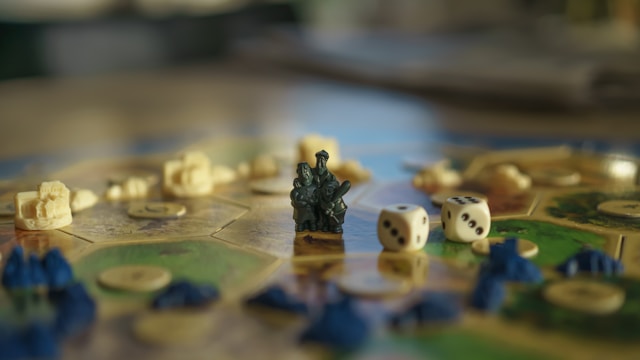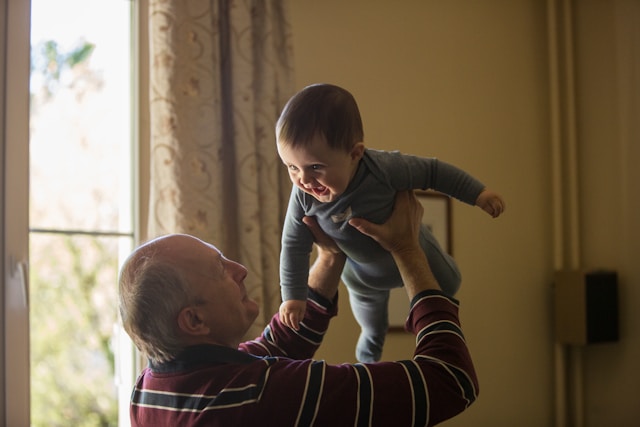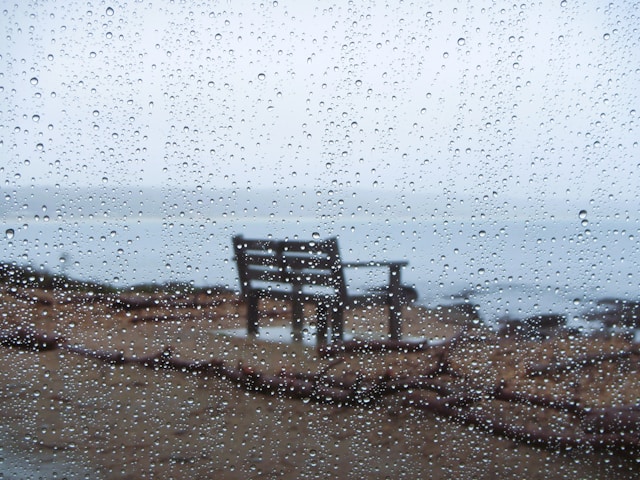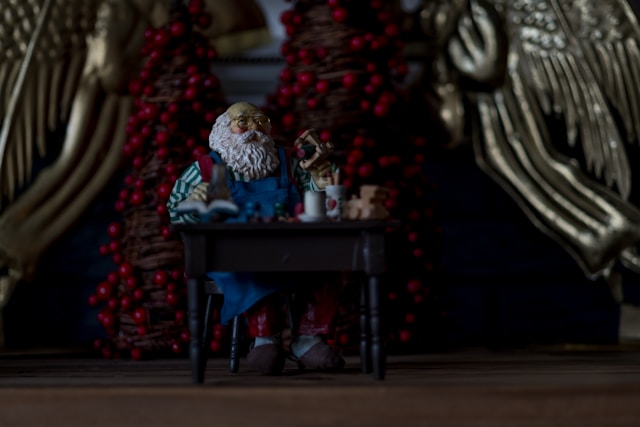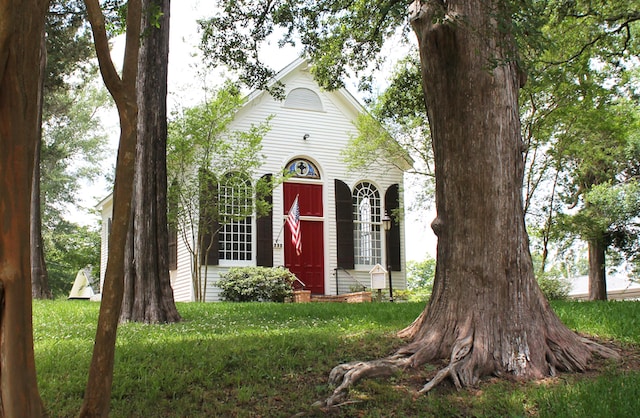Before I was seven, we always spent Christmas with my grandma. She lived in tiny house nestled between two active train tracks we would flatten pennies on. She would hold our hands as we watched TV and the trains shuddered past. She wore an apron always, even to make coffee. For Christmas, we had a pine hand-cut at nighttime by my dad from the railway land. Grandma wrapped presents in large boxes so everything was a surprise. A bracelet for my younger sister Bea might come in a detergent box. An action figure in a TV box. By the end of Christmas Day, we were ankle deep in scraps of wrapping paper. And grandma didn’t drink. Dad knew his mother didn’t know Campari was alcohol so that’s what my parents drank there. Grandma even tried some. She thought it was some foul soft drink from back East. Dad gave me a small glass every once and a while so Grandma didn’t get suspicious.
The year she died; I started having Santa questions. Like how? I live in a city where everything is delivered, and often never arrives. Like why toys? Why not food or other things kids might need? Now a doubter, maybe this was the end to Christmas. I don’t tell this to my parents or my younger sister Bea. It is a magic trick. I want to watch to see how it all actually works.
We are now on our way to stay with Glamma, my other grandma. We leave late, and Dad drives through the night. Mom keeps telling Dad she is “hopeful this time.” We stop for bathroom breaks and snacks at all the rest stops so they can whisper to each other in parking lot.
We arrive Christmas Eve morning. Glamma opens the door for us. She pulls Bea and I through the doorway quickly one by one like we are parachutists. She grabs my shirt to tell me “There are men out back.“ Dad is still in the car, so I’m sent out to check the “perimeter.” At Glamma’s house, parents are no protection. The door slams behind me. I am in her back yard where men empty garbage cans as a few matted restless dogs wait to see what they drop.
I go to the back door and knock for a while before Mom comes out holding a smelly pink turkey. She tosses it into the snow. She pulls me into the house as the dogs circle the turkey and begin pulling it apart. Bea asks Mom if there are presents, but Mom is on the phone asking stores if they have any turkeys left. It’s always bad news, and as she hangs up it gets louder and louder.
Glamma says that that turkey was “just fine” and Mom says “nothing defrosts for a week.” Dad is eating potato chips with his coat still on. “Do we have a tree?” I ask Dad who shrugs. “We may not be staying,” he says and smiles.
Glamma brings out her fudge for Bea and me. She makes dark, rich, dense, sweet fudge that takes two hands to hold. Bea won’t eat it. It scares her. I like it, but you have to eat it slow so you don’t black out.
Glamma drags a fake tree in from the garage. She yells to me for help, and we pull it through her house together. It still has tinsel from past years. Glamma says fake trees are just as good as real ones if you spray them with Pine Sol. We get stuck it in a bend in the hallway and I smell sour breath behind me. A giant hand reaches down and pulls the tree free. Uncle Clarence drags the tree into the living room, clearing several side tables of their lamps and magazines as he does.
Mom is crying in the kitchen. Dad, with his coat off now, tells her he never really liked turkey and would prefer one of Uncle Clarence’s smoked hams. Uncle Clarence smokes hams in his garage which my Aunt Lori hates because it makes her car smell. “Where’s Aunt Lori?” I ask and Mom gives me a bug-eyed “shut up” stare.
The tree is there but no presents. I begin to understand perhaps there are no presents. Maybe doubt, my doubt, is the reason. Maybe there is a no present rule for both naughty children and little know-it-alls.
“We have to decorate the tree.” Glamma says as she grabs Bea’s wrists and drags her to the garage. “Let’s see what we can find.” My sister goes limp, but Glamma still manages to drag her away.
“Why don’t you go with Uncle Clarence to get a ham for dinner?” Mom says giving me my coat.
The door is open and Clarence is already outside so I run. I don’t have to hurry. Once I get in the car, we sit awhile. Clarence stares ahead. The plastic seats are cold. I wonder if the car won’t start, but I don’t want to ask him. Then Clarence turns the key and puts the car into gear. Clarence’s cars have extra gears he adds somehow, and we shoot onto the highway. There isn’t much traffic so it takes me awhile to realize, as we shoot pass every car, that we are going 140 miles an hour. The car seems to lift off the road, and shake like a dryer full of sneakers.
“Our car doesn’t go this fast.” I say. Uncle Clarence looks at me sideways like he is remembering I am here, and he lets off the gas so we coast down to 100.
“You like ham?” He asks. I nod.
He takes his hands off the wheel to look for something and the car weaves between the lanes. He pulls twenty dollars out of his wallet and grabs the wheel again.
“When I say go, if you can pick this twenty-dollar bill off the dashboard, it’s yours.” He tucks the bill behind the window visor. “Go” he says and floors the gas. I thought it would be easy. All I have to go is lift my arm, but it won’t move. I can feel the seat springs. I am slipping up out of my seat into the back.
“Stop.” I say. “Had enough?” He asks. “Yes. YES.” And we coast back to 100. He laughs and takes the twenty dollars back.
Uncle Clarence lives in Kentucky, which I remember as a long trip. But it doesn’t take long today. We spin into his driveway in way that lifts a spray of gravel and stop. I open my door and get out.
“You go in. I can’t just yet.” Uncle Clarence tells me. The back door of Clarence’s house is open. Inside all the nice furniture and family photos are gone. The deer heads, old batteries and dozens of old Playboys in piles are still there. Uncle Clarence finds me wandering around the house looking for hams. He says “Hams are in the basement. Get a big one.”
Dozens of moldy hams hang from the ceiling. They bump into me as I move through the dimly lit basement. I finally find a small ham I can carry, but Clarence tells to get a bigger one. He is busy packing. The new ham I can only get up the stairs if I stop every few steps. It is greasy with salty fat, and slips out of my hands a couple of times. Clarence is sitting in the car when I roll it out the front door. He gets out of the car and throws the ham over his shoulder. Then he slams the door of his house so hard that I can hear the windows shift. It is now dusk. His car is cold and full of boxes. But we are going home.
Clarence doesn’t go back the way we came. We get off the highway to stop in front of a house with the lights on. Clarence kills the engine, and we sit. “Are we going home?” I ask when I think I won’t get yelled at. But Clarence ignores me, drinks from a flask and eventually falls asleep. A little later, when carolers come by, I see Aunt Lori answer the door. It was really cold and dark now. I know Clarence will be mad if I go in to the house so I find one of Aunt Lori’s sweaters in a box to wear. I fall asleep. I dream I am lying naked on a giant frozen metal ice cube tray. The kind that sticks to your skin. I wake up and my hands are blue in the moonlight. I go up to the house and ring the bell.
Aunt Lori calls Mom and puts me on the phone. I think Mom might be mad because she is both crying and talking, but she tells me she’s coming and not to get in the car with Clarence again. Aunt Lori gave me something to eat which is good because Glamma only ever has potato chips and the same dusty hard candies to eat. When I go back out Uncle Clarence is gone and Aunt Lori has started picking her stuff off her lawn. At Glamma’s, there are still no presents under the tree. Dad has his coat on and wants to go home or really anywhere, but Mom talks him into staying.
“What about the presents?” I ask “Tomorrow.” She says as she quietly hides Dad’s shoes.
Bea and I sleep on the floor in the television room. I wake up once when I think I hear Santa after all. It sounds like he’s in the kitchen. I crawl until I can see Glamma squatting in front of the open fridge pouring the last potato chips crumbs from a bag into her mouth. ‘
When I wake next morning, my sister is reading a picture book. “Did Santa come?” I ask. She gulps and shakes her head sadly, and goes back to her book. If there weren’t presents, I didn’t want to go out there either.
Bea and I went in together. Uncle Clarence is there. “You didn’t wake me up.” He says grabbing me by my pajamas, but he laughs. There are presents for Bea. For me, an unwrapped Texaco truck I saw Dad buy at the gas station on the drive here. And a pile of old Playboys wrapped in an animal pelt with a note “Enjoy. Santa” even though I knew there was no way I was going home with them.
Kevin Fisher is an editor and writer for the Cornwall Chronicle. He also writes plays and belongs to writing groups at Ensemble Studio Theatre. Kevin is a trained epidemiologist who worked in HIV prevention advocacy for two decades. He graduated from Brown University and received his JD from New York University School of Law and his master’s from Columbia University Mailman School of Public Health. He is a climate activist with 350Brooklyn and an avid long-distance walker.


